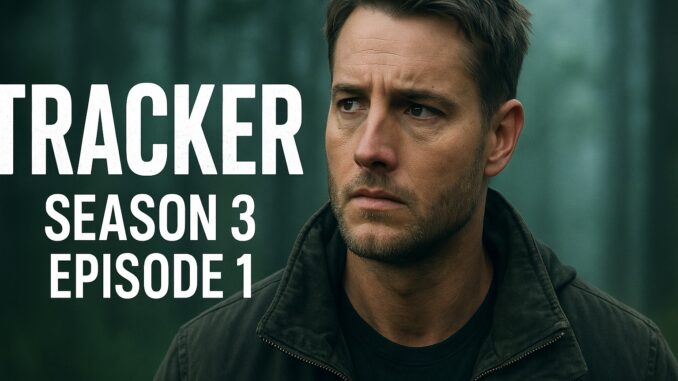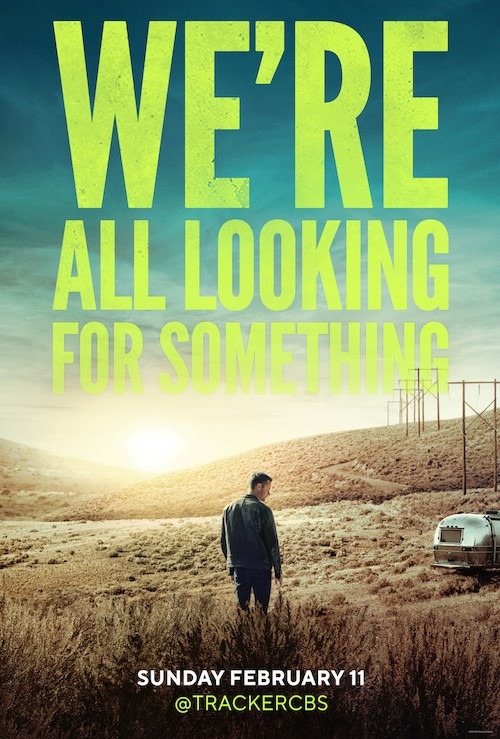
Why This Episode Matters
When you sit down to watch the premiere of Tracker Season 3, Episode 1, you’re not just tuning into another missing-person case. You’re diving head-first into the emotional heart of the series — the mysterious death of Ashton Shaw. Our hero, Colter Shaw (played by Justin Hartley), has already learned that his father didn’t simply fall off a cliff by accident — a man named Otto Waldron (played by Alex Fernandez) was with Ashton on the night he died. That revelation changes everything.
It’s like discovering your house was built on a shifting foundation — nothing feels safe, nothing seems true. And Episode 1 doesn’t just raise questions — it amps them up.
The Big Reveal – Father’s Death, Revisited
Who’s Otto Waldron, and Why Does It Matter?
Right off the bat, we meet Otto Waldron — the man Colter now knows was with his father on that fateful night. That moment flips the script. Previously, Colter and many of us believed Ashton’s death was a tragic accident or the result of some unknown predator in the woods. Now it’s personal. And that makes it heavier.
According to external sources, at the close of Season 2, Colter confronted Otto, who admitted pushing Ashton off the cliff — but there was more. Otto claimed their mother, Mary Dove Shaw (played by Wendy Crewson), asked for his help.
So the question becomes: Did Mary Dove Shaw orchestrate something dark? Did she know more than she let on? Or was Ashton dangerous in ways Colter never suspected?
Colter’s Emotional State at the Start of Season 3
Let’s face it: Colter isn’t a guy who usually stops to smell the roses. He’s the lone-wolf survivalist, the tracker who moves fast, analyzes coldly, solves problems. But when your father’s death shakes your foundation, even the strongest tree shudders in the wind.
In Episode 1, we see Colter dealing with that shock. He’s putting pieces together — not just for his next missing-person case, but for his identity, his family history, and his trust in his mother. That psychological layer gives the episode weight beyond action.
Family Secrets — The Heart of the Mystery
What this episode also does brilliantly: it shifts the focus from isolated cases to family. When Colter realises Otto was with Ashton, and that Mary may have been involved — we’re in a realm of betrayal, hidden motives, and generational damage.
As showrunner Elwood Reid noted, “There’s a much bigger mystery with what his father was up to… and what the mother was doing.”
So Episode 1 works on two levels: the surface case of disappearance, and the deeper case of truth, trust, and lineage.
The Plot Plays Out – What Happens in Episode 1
Case of the Missing Wife & Daughter
While Colter is internally shaken, externally he’s on the job. The premiere wraps the father-mystery around a case: the disappearance of a wife and daughter of a client (via sources).
This dual-narrative works like a mirror: one track is what Colter chases outward (the missing duo), and the other is what he chases inward (his past). The chase for the missing pair becomes symbolic of his own search for missing truth.
Teaming with Russell Shaw
Also significant: Colter teams up with his estranged brother, Russell Shaw (played by Jensen Ackles). That reunion is messy. It stirs old tensions, brings up long-buried grievances, and forces both brothers to face their shared past.
In the premiere, their dynamic is rough — like two athletes forced to run a relay without ever practising. Sparks will fly.
Uncovering the Cliff-Night Truth
As the episode concludes, more pieces of the cliff night come into focus: Otto’s admission, Mary’s possible complicity, Colter’s childhood memories — all boiling into a pot that’s just about to overflow.
This setup matters because it moves Tracker from “solve the case” to “solve yourself”.
Character Arcs in Motion
Colter Shaw – From Tracker to Truth-Seeker
Colter has always been the guy who finds people. In Season 3, Episode 1, it feels like he’s realizing he himself is what’s missing. The man he thought he knew — his father — is now surrounded by lies. And suddenly the tracker has to become the hunted in his own past.
That shift is subtle but powerful. When he confronts Otto, when he looks at his mother differently, we see growth. Will he stay the lone wolf? Or will he accept the pack?
Mary Dove Shaw – The Pillar or the Puppet-Master?
Mary Dove, the mother, has always been somewhat inscrutable. Protective, secretive, and enigmatic. Episode 1 teases the possibility that she was involved in Ashton’s death or at least in the cover-up. That casts her in new light: not just victim or matriarch, but maybe conductor of the symphony behind the scenes.
When the episode opens the door to “why did she ask Otto for help?”, everything changes.
Russell Shaw – Return of the Brother
Russell’s return in Episode 1 is emotional. He’s not just there to help in the case — he’s there to collide with Colter. Their shared history, sibling rivalry, guilt, resentment — it’s all there. One brother stayed behind, one ran ahead, and now they’re both facing the same storm.
The premiere uses that tension to great effect: cooperation, conflict, and catharsis all wrapped in one.
Themes & Motifs—Digging Deeper
Secrets, Lies, and Memory
One big theme in this episode: memory. How reliable is it? What happens when you realise what you believed to be true might be false? Colter’s father’s death is the perfect metaphor.
We all build stories in our heads, then life comes and rewrites them. Episode 1 plays with that idea. What if the bedrock of your life had cracks?
Family as Battle Zone
Unlike previous seasons which emphasized Colter vs the world, Episode 1 turns inward: Colter vs his family. When the enemy is inside, the danger is more personal. And more dangerous.
That metaphor — home as battlefield — resonates throughout the episode.
The Hunter Hunted
Colter is a tracker; he finds people. But this time, he’s tracking truth. And maybe the truth is tracking him. The motif of hunter becoming hunted runs quietly in the background. The missing-wife case is mirrored by a missing-father-truth subplot.
What This Means for the Season Ahead
Bigger Stakes, Wider Scope
Episode 1 sets the season’s tone: this isn’t just episodic anymore. The missing-person cases will still happen, but the thread tying them all will be Colter’s family, his origins, his father’s death. According to sources, the showrunner says there’s “much more to unpack”.
We’re moving from case-of-the-week to an arc-driven existential mystery.
Shift in the Team Dynamic
Significant cast changes accompany this episode: two major characters from previous seasons are gone (Velma and Bobby) and Colter’s team is leaner, more focused on family and fewer gadgets.
That means the story must rely more on character and plot than on procedural tropes — and Episode 1 embraces that.
Expect Emotional Payoff, and Fallout
The setup in Episode 1 hints at emotional gold: brother warfare, mother’s secrets, father’s legacy. But there’s also fallout: trust broken, alliances shifting. The season will likely explore how Colter rebuilds—or whether he breaks.
Why You Should Watch This Episode
It’s the Turning Point
If you’ve watched the show up to this point, Episode 1 of Season 3 is the fork in the road. You’ll look back at Seasons 1-2 and say, “Oh, that was leading here.” It recontextualizes everything.
Stories that shift their axis like this are rare — they risk losing the audience, but Tracker nails the transition.

Strong Character Work
This isn’t just action for action’s sake. The emotional stakes are real. We care about Colter because we’ve seen his journey; now we care because his journey threatens to collapse under the weight of his past.
Episode 1 treats him as human — flawed, confused, haunted — and that makes the thrills hit harder.
Intrigue + Momentum
The missing-wife case gives immediate momentum; the father-mystery gives long-term intrigue. It’s a combo that keeps you watching and thinking.
If you like shows that make you stay up at night speculating, this episode delivers.
Key Takeaways & Easter Eggs
Pay Attention to the Cliff Night Flashbacks
The episode peppers in hints: conversations in the cabin, distant memories, ambiguous references. These are key. They’re the little breadcrumbs leading to the big reveal.
If you glance past them, you’ll miss how carefully they’re laying the groundwork.
Mary’s Behavior Is Suspiciously Calm
Watch how Mary reacts when Colter brings up his father. Not always defensive, but controlled. That’s telling. It suggests she knows more than she admits — and maybe fears less than we think.
Russell’s Return Is Not Just for Drama — It’s Necessary
When Russell comes back, it’s not just so Colter has backup. It’s so the two halves of the Shaw story get told together. Expect their dynamic to fuel much of the season’s conflict and resolution.
Frequently Asked Questions About Episode 1 (and What They Hint At)
Will this episode answer everything about Ashton’s death?
No. It gives major answers — yes, Otto was there; yes, Mary was involved in asking for help. But the show is clearly saving why and how for later episodes. The mystery deepens rather than resolves.
In other words: it’s the doorway, not the destination.
Do the missing-person case and father’s death storyline connect?
Yes, and perhaps no. On one level, they’re separate: Colter is doing his job. On another level, the two are thematically linked: the pursuit of missing things (people, truths). How they weave together across the season remains to be seen, but Episode 1 plants the seeds.
Is the cast change going to affect the vibe?
Definitely. With some key characters gone, the tone shifts. The focus is more on Shaw family, less on side-kick gadgetry. Some viewers will miss the old team dynamic, but the new structure gives the show a chance to deepen.
Sources indicate the team is downsizing for more intense storytelling.
H2: Should I re-watch Seasons 1-2 before diving into Episode 1?
If you can — yes. Because Episode 1 relies on emotional pay-offs built over the first two seasons (especially around the father’s death, Mary’s secrets, Russell’s estrangement). A refresher will help.
If you don’t, you’ll still enjoy the episode — it stands on its own — but you’ll miss a lot of nuance.
What’s the mood of this premiere compared to earlier episodes?
More introspective. Earlier episodes often emphasized Colter as the action hero solving cases. This one still has action – you’ll get tracking, suspense, danger – but it’s punctuated by internal conflict, emotional beats, family drama. The show steps up its narrative game.
Conclusion
Episode 1 of Tracker Season 3 isn’t just a fresh start — it’s a game changer. By revealing Otto Waldron’s presence on the night Ashton Shaw died, and by implicating Mary Dove Shaw in that fateful event, the show shifts from procedural + thriller into something deeper: a family mystery, a legacy of secrets, and a man haunted by his past chasing the truth.
If you love layered characters, emotional stakes, and stories that make the breeze feel like thunder, this episode delivers. It lays the tracks for a high-octane season where every step forward might unravel someone you thought you knew.
Hang on tight. Colter Shaw isn’t just tracking others anymore — he’s tracking himself. And the truth may be the hardest terrain of all.